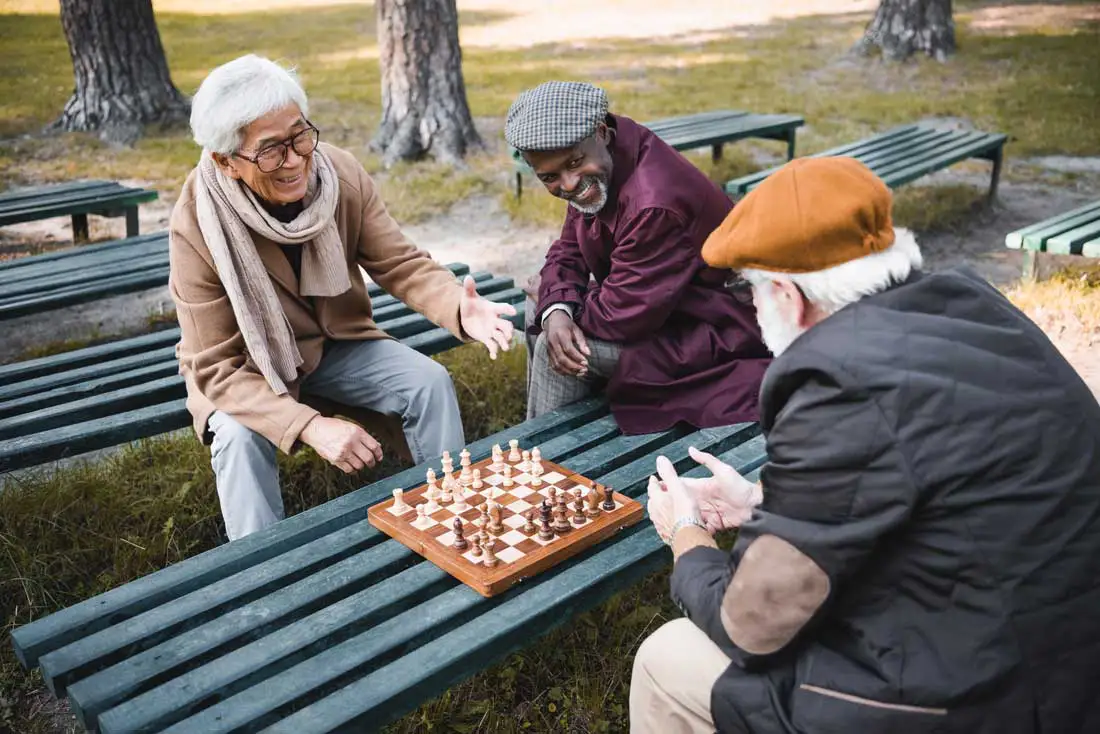Whether you spend hours playing golf in the sunshine, chasing around grandchildren at the park, or enjoying a weekly spa treatment and indulging in lazy lunches with friends, many of us have imagined what we’d like retirement to look like.
Your vision for retirement likely stretches far beyond necessities and basic activities of daily living (ADLs). That’s because a fulfilling lifestyle is not simply about staying physically healthy – it’s about crafting the life you always dreamed of.
What Does a Healthy Lifestyle Look Like for Seniors?
Maintaining a healthy lifestyle while aging is much more than eating a good diet and exercising. A recent McKinsey Health Institute (MHI) survey found that 21,000+ older adults worldwide mostly agree that purpose, stress management, meaningful connections, and independence are critical [1]. Therefore, a holistic retirement lifestyle approach will consider physical health and mental, social, and cognitive well-being.
While exercising and regularly visiting the doctor helps take care of physical health, social activities, hobbies, and maintaining independence can support mental and cognitive health. Other lifestyle choices can have all-round positive effects. For example, getting the right nutrients with a balanced diet can support physical, mental, and cognitive health.
5 Lifestyle Questions to Ask When Touring Residential Assisted Living
When touring senior living communities with your parent or relative, the following questions may help you understand the lifestyle they can offer.
-
- How do you encourage natural socialization between residents? Some seniors require a little support to socialize and make new friends in assisted living. If your loved one is shy or apprehensive about moving, find out how the communities on your shortlist support and encourage residents socially.
- What activities and events can residents access on-site? Having a good range of on-site activities is vital in senior living, particularly for seniors with poor mobility, dementia, or another health issue that prevents them from getting out and about. Determine whether a community’s classes and activities align with your loved one’s interests.
- Can you provide examples of how residents are given choices? In some big-box facilities or communities with a lower staff-to-resident ratio, caregivers may have less time available to offer truly personalized care. We’ve already touched upon the importance of feeling independent and purpose for seniors. [1] Allowing residents to set their daily routines, providing multiple meal options, and offering a range of activities can help create independent lifestyles.
- How are visits from healthcare providers coordinated? The National Council on Aging (NCOA) recently reported that almost all (94.9%) seniors over 60 have a chronic health condition. Over three-quarters (78.7%) have two or more. [2] Well-coordinated, reliable healthcare helps seniors stay fit and well enough to achieve their lifestyle goals.
- How do you cultivate a homelike environment? It’s no secret that the physical environment we live in can impact our mental health, and it’s challenging to build a fulfilling lifestyle in a setting that feels cold and clinical. When touring communities, consider how you feel as you walk through the door. Is it warm, cozy, welcoming, or impersonal and ‘facility-like’?
How Does Silverleaf Eldercare Promote a Healthy Lifestyle for Senior Living Residents?
Silverleaf Eldercare operates three thriving residential assisted living homes. We’re proud to have received RALA Residential Assisted Living Specialist and Memory Care Specialist designations and continually educate ourselves to expand our expertise on emerging issues in senior living.
We believe that seniors should feel empowered to live the lifestyle they always wished for in retirement; they should never feel restricted by living in assisted living. With the best senior living staffing ratio in Austin (one caregiver for every six residents), we’re able to offer much more than basic care, instead focusing on helping seniors cultivate the day-to-day life they desire.
Silverleaf Eldercare is the perfect residential senior living community for retirees who:
-
- Value home comforts. Our locations are mindfully designed to function just like a private home. With warm lighting, plush bedrooms, and sleek, modern design choices, our senior living homes do not feel like a facility.
- Prefer a specialty diet. We have dedicated chefs on-site who prepare a perfect balance of delicacies and comfort foods. Mealtime choices are available, and many of our residents are vegan or vegetarian. Some residents also follow paleo, diabetic, low-carb, or keto diets. A fulfilling lifestyle is about choice — this includes dietary choice.
- Like to enjoy a range of hobbies. We’re incredibly proud of the variety of activities and events we offer, including fitness activities, mindfulness classes, and jazz, country, Latin, and opera concerts. Residents also have access to iN2L, an innovative digital platform with 5,000+ content applications. This content suits seniors with a diverse range of interests and hobbies, promoting social interaction, cognitive engagement, lifelong learning, and more.
- Like to stay physically fit and healthy. Suppose your loved one has always enjoyed exercise and healthy habits. In that case, Silverleaf Eldercare is their ideal residential senior living community. Our residents can stay healthy in mind, body, and soul by offering a range of healthful food options alongside exercise and mindfulness classes, including yoga and meditation. We expertly coordinate visits from healthcare professionals for seamlessly integrated care and use CarePredict technology to ensure each resident gets the perfect level of support each day.
To explore the range of lifestyle options our assisted living residents enjoy, call us today and arrange a tour of our vibrant Austin residential senior living communities.
Cited Sources
[1] https://www.mckinsey.com/mhi/our-insights/age-is-just-a-number-how-older-adults-view-healthy-aging
[2] https://www.ncoa.org/article/the-top-10-most-common-chronic-conditions-in-older-adults

